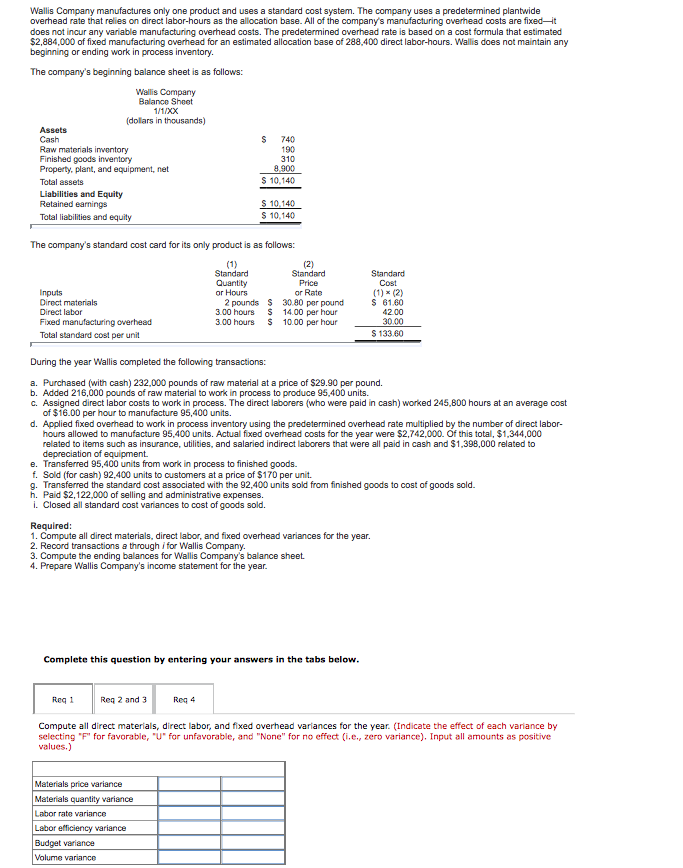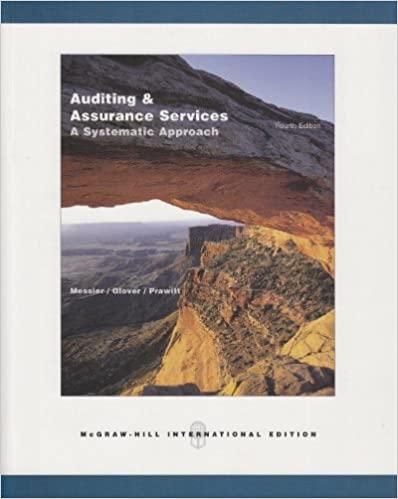
Wallis Company manufactures only one product and uses a standard cost system. The company uses a predetermined plantwide overhead rate that relies on direct labor-hours as the allocation base. All of the company's manufacturing overhead costs are fixedit does not incur any variable manufacturing overhead costs. The predetermined overhead rate is based on a cost formula that estimated $2,884,000 of fixed manufacturing overhead for an estimated allocation base of 288.400 direct labor-hours. Wallis does not maintain any beginning or ending work in process inventory. The company's beginning balance sheet is as follows: S 740 190 Wilis Company Balance Sheet 1/1/XX (dollars in thousands) Assets Cash Raw materials inventory Finished goods inventory Property, plant, and equipment, net Total assets Liabilities and Equity Retained earnings Total liabilities and equity 310 8.900 $ 10.140 S 10.140 $ 10,140 The company's standard cost card for its only product is as follows: Inputs Direct materials Direct labor Fixed manufacturing overhead Total standard cost per unit (1) Standard Quantity or Hours 2 pounds $ 3.00 hours S 3.00 hours S Standard Price or Rate 30.80 per pound 14.00 per hour 10.00 per hour Standard Cost (1) (2) S 61.60 4200 30.00 S 133.60 During the year Wallis completed the following transactions: a. Purchased (with cash) 232,000 pounds of raw material at a price of $29.90 per pound. b. Added 216.000 pounds of raw material to work in process to produce 95,400 units. c. Assigned direct labor costs to work in process. The direct laborers (who were paid in cash) worked 245,800 hours at an average cost of $16.00 per hour to manufacture 95,400 units. d. Applied fixed overhead to work in process inventory using the predetermined overhead rate multiplied by the number of direct labor- hours allowed to manufacture 95,400 units. Actual fixed overhead costs for the year were $2,742,000. Of this total, $1,344,000 related to items such as insurance, utilities, and salaried indirect laborers that were all paid in cash and $1,398,000 related to depreciation of equipment e. Transferred 95,400 units from work in process to finished goods. f. Sold (for cash) 92.400 units to customers at a price of $170 per unit. 9. Transferred the standard cost associated with the 92.400 units sold from finished goods to cost of goods sold. h. Pald $2.122.000 of selling and administrative expenses. i. Closed all standard cost variances to cost of goods sold. Required: 1. Compute all direct materials, direct labor, and fixed overhead variances for the year. 2. Record transactions through for Wallis Company. 3. Compute the ending balances for Wallis Company's balance sheet. 4. Prepare Wallis Company's income statement for the year. Complete this question by entering your answers in the tabs below. Reg 1 Reg 2 and 3 Reg 4 Compute all direct materials, direct labor, and fixed overhead variances for the year. (Indicate the effect of each variance by selecting "F" for favorable, "U" for unfavorable, and "None" for no effect (i.e., zero variance), Input all amounts as positive values.) Materials price variance Materials quantity variance Labor rate variance Labor efficiency variance Budget variance Volume variance Wallis Company manufactures only one product and uses a standard cost system. The company uses a predetermined plantwide overhead rate that relies on direct labor-hours as the allocation base. All of the company's manufacturing overhead costs are fixedit does not incur any variable manufacturing overhead costs. The predetermined overhead rate is based on a cost formula that estimated $2,884,000 of fixed manufacturing overhead for an estimated allocation base of 288.400 direct labor-hours. Wallis does not maintain any beginning or ending work in process inventory. The company's beginning balance sheet is as follows: S 740 190 Wilis Company Balance Sheet 1/1/XX (dollars in thousands) Assets Cash Raw materials inventory Finished goods inventory Property, plant, and equipment, net Total assets Liabilities and Equity Retained earnings Total liabilities and equity 310 8.900 $ 10.140 S 10.140 $ 10,140 The company's standard cost card for its only product is as follows: Inputs Direct materials Direct labor Fixed manufacturing overhead Total standard cost per unit (1) Standard Quantity or Hours 2 pounds $ 3.00 hours S 3.00 hours S Standard Price or Rate 30.80 per pound 14.00 per hour 10.00 per hour Standard Cost (1) (2) S 61.60 4200 30.00 S 133.60 During the year Wallis completed the following transactions: a. Purchased (with cash) 232,000 pounds of raw material at a price of $29.90 per pound. b. Added 216.000 pounds of raw material to work in process to produce 95,400 units. c. Assigned direct labor costs to work in process. The direct laborers (who were paid in cash) worked 245,800 hours at an average cost of $16.00 per hour to manufacture 95,400 units. d. Applied fixed overhead to work in process inventory using the predetermined overhead rate multiplied by the number of direct labor- hours allowed to manufacture 95,400 units. Actual fixed overhead costs for the year were $2,742,000. Of this total, $1,344,000 related to items such as insurance, utilities, and salaried indirect laborers that were all paid in cash and $1,398,000 related to depreciation of equipment e. Transferred 95,400 units from work in process to finished goods. f. Sold (for cash) 92.400 units to customers at a price of $170 per unit. 9. Transferred the standard cost associated with the 92.400 units sold from finished goods to cost of goods sold. h. Pald $2.122.000 of selling and administrative expenses. i. Closed all standard cost variances to cost of goods sold. Required: 1. Compute all direct materials, direct labor, and fixed overhead variances for the year. 2. Record transactions through for Wallis Company. 3. Compute the ending balances for Wallis Company's balance sheet. 4. Prepare Wallis Company's income statement for the year. Complete this question by entering your answers in the tabs below. Reg 1 Reg 2 and 3 Reg 4 Compute all direct materials, direct labor, and fixed overhead variances for the year. (Indicate the effect of each variance by selecting "F" for favorable, "U" for unfavorable, and "None" for no effect (i.e., zero variance), Input all amounts as positive values.) Materials price variance Materials quantity variance Labor rate variance Labor efficiency variance Budget variance Volume variance







